- Home
- Maggie Stiefvater
Call Down the Hawk Page 2
Call Down the Hawk Read online
Page 2
Ronan continued, “There are stains that spread faster than you drive. If you drive, it’ll take fourteen years to get there. Seventeen. Forty. One hundred. We’ll be driving to your funeral by the end.”
The Lynch brothers were on the first road trip they’d been on since their parents died. They’d made it fifteen minutes from Declan’s home before Declan had received a call he refused to take in the car. Now they continued to be delayed by negotiations for the driver’s seat. Ronan had driven this far; opinions were divided on whether he should get the privilege again. In the Goodwill lot, the brothers presented the facts: It was Declan’s car, Ronan’s trip, Matthew’s vacation. Declan had a letter from the insurance company offering him better rates for his exceptional driving record. Ronan had a letter from the state advising him to change his driving habits lest he lose his license. Matthew had no interest in driving; he said if he didn’t have enough friends to drive him anywhere he wanted to go, he was living his life wrong. In any case, he’d failed his driver’s test three times.
“Ultimately the decision is mine,” Declan said, “as it’s my car.”
He didn’t add and also because I’m the oldest, although it hung in the air. Epic battles had been waged between the brothers over this understood sentiment. It represented considerable progress in their relationship that it remained unspoken this time.
“Thank Jesus,” Ronan said. “No one else wants it.”
“It’s very safe,” Declan murmured, eyes on his phone. Time burned as he replied to a text or email in the peculiar way he always did, typing with his left thumb and his right index finger.
Ronan kicked one of the Volvo’s tires. He wanted to be on the road. He needed to be on the road.
“We’ll swap every two hours,” Declan finally said in his bland way. “That’s fair, right? You’re happy. I’m happy. Everyone’s happy.”
That was untrue. Only Matthew was perfectly happy, because Matthew was always perfectly happy. He looked pleased as a pig in slop as he slid into the backseat with his headphones. He said cheerily, “I’m gonna need snacks before this rig gets to where it’s goin’.”
Declan put the keys in Ronan’s hands. “If you get pulled over, you’re never driving my car again.”
Then they were off, properly off, Washington, DC, in the rearview mirror.
Ronan couldn’t quite believe that Declan had agreed to the premise of the road trip. This excursion, designed for Ronan to tour three rental properties in an entirely different state, seemed to fall solidly under activities Declan would’ve frowned upon in the past. Ronan, with his dangerous dreams, sleeping someplace other than the Barns or Declan’s town house? Dubious. Moving someplace other than the Barns or Declan’s town house? Never.
Ronan didn’t know why Declan was entertaining it. What he did know was that they were an eight-hour drive from finding out if Ronan got to start a whole new life. Aside from a miserable period just after their father, Niall, had died, he’d never lived anywhere but the Barns, the family farm. He loved the Barns, he was bored of the Barns, he wanted to leave, he wanted to stay. At the Barns, Ronan was two seconds from his childhood memories and two hours’ drive from his brothers. He knew he could dream safely there, surrounded by nothing but other dreams. He knew who he was there.
Who would Ronan Lynch be in Cambridge?
He had no idea.
In Maryland, they swapped and obtained gas station snacks for Matthew. He ate them in the backseat, noisily, with audible enjoyment. As Declan pulled back onto the interstate, he ordered Matthew to close his mouth while eating; a fruitless exhortation, as people had been saying this to Matthew for seventeen years.
“Just get him soft food,” Ronan advised. “That’s the solution. No one hears gummy snacks go down the hatch.”
Matthew laughed again. The only thing he enjoyed more than jokes about Declan were jokes about himself.
After they had been on the road for several minutes, Declan asked Ronan in a low voice, “How long has it been since you dreamt?”
Matthew wasn’t listening, lost in the pleasures of his headphones and the game on his phone, but it wouldn’t have mattered anyway. Ronan’s dreaming wasn’t a secret to Matthew. Declan just liked everything better if it was a secret.
“Recently.”
“Recently enough?”
“I don’t know, let me check my dreamer schedule. It’ll tell me precisely how recently is recently enough.” Ronan emptied a bag of chocolate-covered peanuts into his mouth in the hopes that it would end the conversation. He didn’t want to talk about it,but he didn’t want to sound like he didn’t want to talk about it. He choked a little bit on the peanuts but otherwise managed to look diffident. Unconcerned. It would be fine, his peanut-eating added. Let’s talk about something else, his peanut-eating suggested. You’re being unreasonable to even ask, the peanut-eating concluded.
Declan held a protein bar against the steering wheel but didn’t open it. “Don’t act like I’m being unreasonable to ask.”
There were two major reasons why overnight traveling was fraught for a dreamer. The first, and most obvious, was that Ronan could never be one hundred percent certain that he wasn’t going to accidentally manifest one of his dreams when he woke up. Sometimes the dreams were harmless—a feather, perhaps, or a dead aquarium fish, or a potted plant. But sometimes they were formless songs that made the listener feel physically sick, or lizards with insatiable appetites, or two thousand Oxford shoes, all lefts, all size 9. When these things appeared in waking life at the Lynch family’s remote Barns, they were annoyances, sometimes a little more (lizard bites could be very painful). But when they appeared in waking life at Declan’s town house or in a hotel room or next to the car Ronan slept in at a rest area—well.
“Can I open your unhappy yuppie candy bar for you?” Ronan asked.
“Don’t deflect,” Declan chided. But after a moment, he handed over the protein bar.
Ronan peeled the wrapper open and took an experimental bite before handing it back. It felt precisely like he’d fallen face-first into wet, dirty sand.
“Classy, Ronan.” Declan blew lightly on the bitten end of the bar as if his breath would lift the Ronan-germs from it. “I just don’t know if you’re taking this seriously.”
The second reason why traveling as a dreamer was fraught was the nightwash: a sexy word Ronan had invented for an unsexy phenomenon. It was a fairly new consequence for him, and all he knew was that if he waited too long between manifesting dreams or spent too long away from the western Virginia foothills where he was born, black ooze began to run from his nose. Then his eyes. Then his ears. If it went unchecked, he could feel it filling his chest, his brain, his body. Killing him. Maybe there was a way to stop it, but Ronan didn’t know any other living dreamers to ask. He’d only known two in his life—his father and a now-dead student at his high school—and they’d never talked about it. How well would he tolerate staying in Cambridge, Massachusetts, instead of at the Barns for any length of time? He wouldn’t know until he tried.
“It’s my turn to pick the music,” Matthew said.
“No,” Declan and Ronan agreed at once.
Declan’s phone fussed for attention in the center console. Ronan started to pick it up, but Declan snatched it out of his hands with such speed that he nearly ran off the road. Ronan just had time to see the beginning of the incoming text: The key is—
“Whoa there, outlaw,” said Ronan. “I wasn’t gonna touch your girl.”
Declan shoved the phone into the driver side pocket.
“New personal trainer?” Ronan suggested. “New protein bar supplier? Hot lead on some high-tread carpet for the home and garden?”
Declan didn’t reply. Matthew hummed along happily to his headphones.
Neither of his brothers had said anything about how they felt about Ronan moving, and he couldn’t decide if it was because it didn’t make a difference to them or because they didn’t really think it would wo
rk.
He didn’t know which one he’d rather it was.
New York: They pulled over at a service area. Matthew sprinted lightly for the toilets. Declan took another call. Ronan paced. The wind felt crafty and inventive as it worked under his collar, and his pulse felt as fast and streaky as the thin November clouds above.
The little trees bordering the service area were sparse and shapeless, gathered sticks rather than a forest. They were foreign trees. Strangers. Fragile citizens of an urban zip code. Somehow the sight of them drove home the truth of what Ronan was attempting. For so many years, nothing had changed. He’d dropped out of high school, which he didn’t regret, not exactly, and his friends had graduated. Two of them, Gansey and Blue, had invited him on their gap year cross-country road trip, but he hadn’t wanted to go anywhere then. Not when he had just gotten entirely wrapped up in—
“… Adam yet?” Matthew had asked a question, but Ronan had missed it. Matthew had returned with a bag of gummies, and he monched them quietly. “See, I take constructive cristicism. Criticist. Criticism. Gol darn it.”
Adam.
Adam Parrish was the destination of this road trip.
Is there any version of you that could come with me to Cambridge? Adam had asked the day he left.
Maybe. Ronan had visited him once since the semester began, but it had been spontaneous—he’d gotten in his car in the middle of the night, spent the day with Adam, and then left the city without closing his eyes for a second. He hadn’t really wanted to test himself.
Plausible deniability. Ronan Lynch could make it in Cambridge until proven otherwise.
Adam.
Ronan missed him like a lung.
Declan reappeared, looking at his watch with the expression of a man used to it disappointing him. He opened the driver side door.
“Hey, it’s my turn,” Ronan protested. If he wasn’t driving, he knew his thoughts would race for the final two hours of the drive. Adam knew Ronan was coming this weekend, but he didn’t know Ronan had appointments to see rentals. Ronan couldn’t decide how he’d react. “We had a deal.”
“A deal full of Goodwill,” Matthew said. “That’s a joke.”
“You aren’t driving my car among those Massholes.” Declan shut the door as punctuation. Matthew shrugged. Ronan spat.
In the car, Matthew leaned forward to triumphantly claim the AUX cable. A dubstep remix of a pop song oompahed over the speakers.
It was going to be a long two hours to Cambridge.
Ronan put his jacket over his head to drown out the sound and muffle his building nerves. He could feel his pulse thudding in his jaw. He could hear it in his ears. It sounded like everyone else’s heartbeat, he thought. Just like Adam’s heart when his head was resting on his chest. Ronan wasn’t that different. Well, he could seem not that different. He could move to follow the guy he loved, like anyone else. He could live in a city, like anyone else. It could work.
He began to dream.
There was a voice in Ronan’s dream.
You know this isn’t how the world is supposed to be.
It was everywhere and nowhere.
At night, we used to see stars. You could see by starlight back then, after the sun went down. Hundreds of headlights chained together in the sky, good enough to eat, good enough to write legends about, good enough to launch men at.
You don’t remember because you were born too late.
The voice was unavoidable and natural, like air, like weather.
Maybe I underestimate you. Your head’s full of dreams. They must remember.
Does any part of you still look at the sky and hurt?
Ronan was lying in the middle of an interstate. Three lanes each direction, no cars, just Ronan. In the way of dreams, he understood that the road began at the Barns and ended at Harvard and that he was somewhere in between. Little strangled trees struggled through the thin grass by the road. The sky was the same color as the worn asphalt.
We used to hear the stars, too. When people stopped talking, there was silence. Now you could shut every mouth on the planet and there’d still be a hum. Air-conditioning groaning from the vent beside you. Semi trucks hissing on a highway miles away. A plane complaining ten thousand feet above you.
Silence is an extinct word.
It bothers you, doesn’t it?
But the dream was perfectly silent, except for the voice. Ronan hadn’t thought about how long it had been since he’d experienced perfect silence until that moment. He wasn’t sure he had experienced perfect silence before that moment. It was peaceful, not dead. Like putting down a weight he hadn’t realized he was carrying, the weight of noise, the weight of everyone else.
Magic. It’s a cheap word now. Put a quarter in the slot and get a magic trick for you and your friends. Most people don’t remember what it is. It is not cutting a person in half and pulling a rabbit out. It is not sliding a card from your sleeve. It’s not are you watching closely?
If you’ve ever looked into a fire and been unable to look away, it’s that. If you’ve ever looked at the mountains and found you’re not breathing, it’s that. If you’ve ever looked at the moon and felt tears in your eyes, it’s that. It’s the stuff between stars, the space between roots, the thing that makes electricity get up in the morning.
It fucking hates us.
Ronan wasn’t sure what the voice belonged to, or if it belonged to anything. In a dream, physical truths were unimportant. Maybe the voice belonged to this road beneath him. The sky. Someone standing just out of sight.
The opposite of magical is not ordinary. The opposite of magical is mankind. The world is a neon sign; it says HUMANITY but everything’s burnt out except MAN.
Are you understanding what I’m trying to tell you?
Ronan felt rumbling against his skull: distant trucks roaring toward him where he lay in the center lane.
He refused to let the dream be a nightmare.
Be music, he told the dream.
The rumbling of approaching trucks turned into the thudding of Matthew’s dubstep.
The world’s killing you, but They’ll kill you faster. Capital-T They. Them. You don’t know Them yet, but you will.
Bryde. The voice’s name suddenly dropped into Ronan’s thoughts in the way the knowledge about the interstate had, presented as an understood truth: The sky was blue; the asphalt was warm; the voice belonged to someone whose name was Bryde.
There are two sides to the battle in front of us, and on one side is Black Friday discount, Wi-Fi hotspot, this year’s model, subscription only, now with more stretch, noise-canceling-noise-creating headphones, one car to every green, this lane ends.
The other side is magic.
With effort, Ronan recalled where his physical body was, riding in a car with his brothers, on his way to Adam and a new life with his dreams firmly under control.
Don’t bring anything back, Ronan told himself. Don’t bring back a truck, or a road sign, or dubstep that can never be shut off, only buried in a yard somewhere. Keep your dreams in your head. Prove to Declan you can do it.
Bryde whispered:
You are made of dreams and this world is not for you.
Ronan woke up.
Wake up, Waaaaaashington, DC! Authorities should be notified,” laughed TJ Sharma, the host of the party. “Someone tell them a young woman with superpowers is on the loose.”
All eyes in the DC-suburb McMansion were on Jordan, a young woman with eyes like a miracle and a smile like a nuclear accident. The other partygoers wore relaxed casual; Jordan didn’t believe in either relaxing or being casual. She wore a leather jacket and lace bustier, her natural hair pulled into an enormous kinky ponytail. The floral tattoos on her neck and fingers glowed bright against her dark skin and her enthusiasm glowed bright against the suburban night.
“Shhh, shhh,” Jordan said. “Superpowers are like children, mate—”
“Two-point-five for every American family?” TJ asked.
> “Better seen than heard,” Jordan corrected.
In the background, a nineties band whined frantically about their youth. The microwave dinged—more cheap popcorn. The party’s mood was equally ironic and nostalgic; TJ had joked the theme was delayed development. There was a punch bowl full of Cinnamon Toast Crunch, and SpongeBob played on the flat screen next to a pile of PS2 games. The partygoers were all mostly whiter than her, older than her, safer than her. She didn’t know what they’d be doing at this party if she wasn’t performing for them.
“Push in, punters—queuing is for rule followers,” she said. She indicated the scratch paper TJ had provided. “Homework time. No partial credit. Write ‘the quick brown fox jumps over the lazy dog’ and then put your name to it in your best school signature.”
Jordan was attending this party as Hennessy. No one here knew the real Hennessy, so there was no one to say she wasn’t. Even TJ knew her as Hennessy. Jordan was accustomed to wearing identities that weren’t hers—it would’ve felt stranger, in fact, for someone to know her by her actual name.
“You’re gonna love this,” TJ told the others, voice invested with high excitement. Jordan liked him well enough—he was the young vice president of an area bank, a slender-boned Peter Pan, a boy in a grown-up world, or vice versa. He still bought himself toys and waited for his phone to tell him when to go to bed. He lived in this mass-produced mansion with roommates, not because he couldn’t afford to live alone, but because he hadn’t yet learned how to.
They’d met on the streets of DC just a few weeks after Hennessy and Jordan had first arrived in the area. One a.m., nothing but anticipation and mercury vapor lighting the night. Jordan was on her way to return a stolen car before it got them all shot, and TJ was returning from a bored midnight Walmart run.
His: a souped-up Toyota Supra he’d bought off eBay after seeing one in a YouTube series.

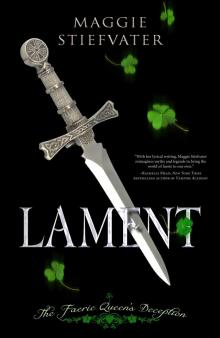 Lament: The Faerie Queens Deception
Lament: The Faerie Queens Deception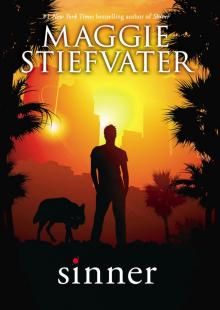 Sinner
Sinner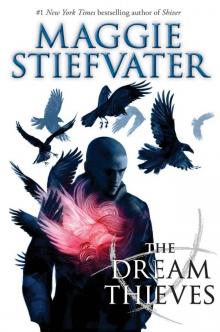 The Dream Thieves
The Dream Thieves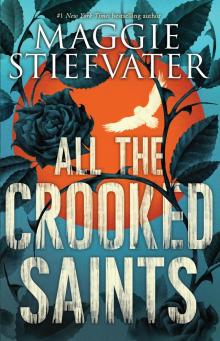 All the Crooked Saints
All the Crooked Saints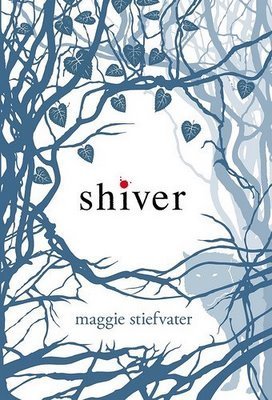 Shiver
Shiver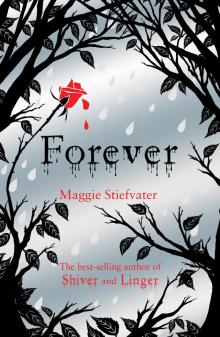 Forever
Forever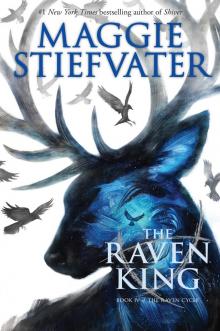 The Raven King
The Raven King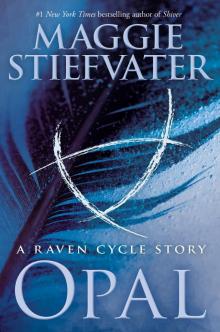 Opal
Opal Linger
Linger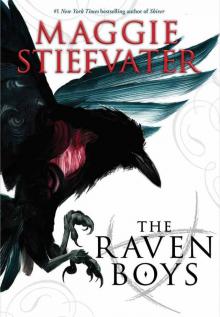 The Raven Boys
The Raven Boys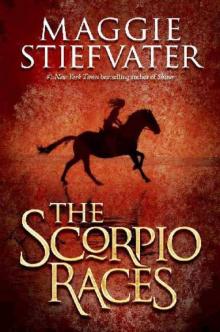 The Scorpio Races
The Scorpio Races Hunted
Hunted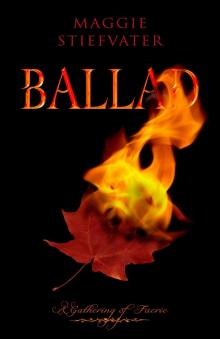 Ballad: A Gathering of Faerie
Ballad: A Gathering of Faerie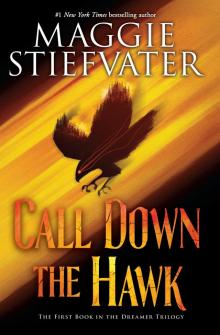 Call Down the Hawk
Call Down the Hawk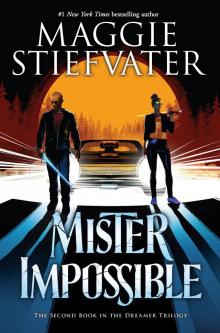 Mister Impossible
Mister Impossible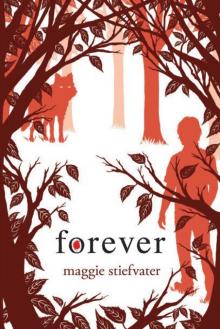 Wolves of Mercy Falls 03 - Forever
Wolves of Mercy Falls 03 - Forever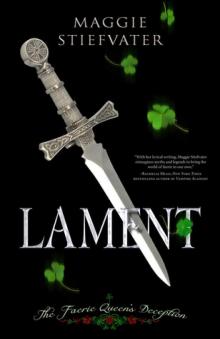 Lament
Lament![Maggie Stiefvater - [Wolves of Mercy Falls 02] Read online](http://i1.bookreadfree.com/i1/04/04/maggie_stiefvater_-_wolves_of_mercy_falls_02_preview.jpg) Maggie Stiefvater - [Wolves of Mercy Falls 02]
Maggie Stiefvater - [Wolves of Mercy Falls 02]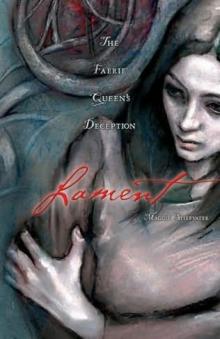 Lament: The Faerie Queen's Deception
Lament: The Faerie Queen's Deception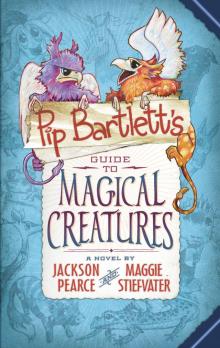 Pip Bartlett's Guide to Magical Creatures
Pip Bartlett's Guide to Magical Creatures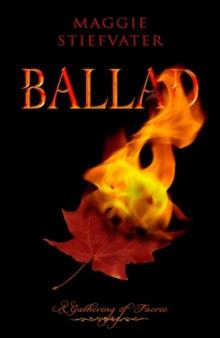 Ballad
Ballad